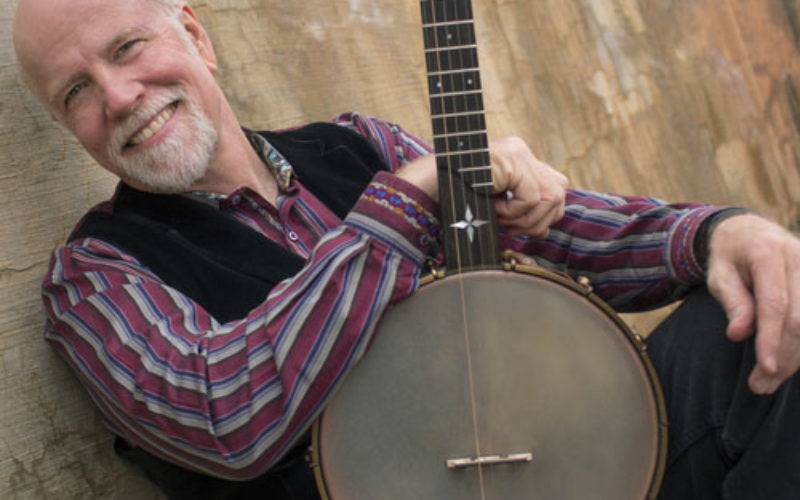BECCA MARTIN-BROWN
bmartin@nwaonline.com
“John McCutcheon is not only one of the best musicians in the USA, but also a great singer, songwriter and song leader. And not just incidentally, he is committed to helping hard-working people everywhere to organize and push this world in a better direction.”
— Pete Seeger
In the past few years, John McCutcheon has headlined more than a dozen different festivals in North America — including repeated performances at the National Storytelling Festival — recorded an original composition for Virginia Public Television involving more than 500 musicians, toured Australia for the sixth time, toured Chile in support of a women’s health initiative, appeared in a Woody Guthrie tribute concert in New York City, gave a featured concert at the Smithsonian Folklife Festival, taught performance art skills at a North Carolina college, given symphony pops concerts across America, served as president of the fastest-growing chapter in the Musicians Union and performed a special concert at the National Baseball Hall of Fame.
On Feb. 26-27, he’ll perform and speak at St. Paul’s Episcopal Church in Fayetteville as part of the McMichael Lecture Series. His program is titled “Make Me an Instrument: Singing the Unsayable.” McCutcheon answered these five questions for What’s Up!
Q. Tell me about your musical influences as a young person?
A. Oh, I listened to the radio, like most kids. It was the beginning of the Beatles, so that was exciting. R&B, Motown, you know. … The big change was on Aug. 28, 1963. My mother made me sit my 11-year-old butt down next to her and watch the March on Washington. The music was really diverse and amazing: Marion Anderson, Mahalia Jackson, and it was the day I discovered folk music: Joan Baez, Bob Dylan, Peter, Paul, & Mary, Odetta. But, mostly, it was the way people — 200,000 of them! — sang along. It was participatory. It told me I was welcome and that I could do it. And, not incidentally, it was connected to something righteous and bigger than myself.
Q. When/how did you know music was going to be the centerpiece of your life?
A. I probably realized it after it happened. My best friend and I obsessed about folk music. … We got guitars and, pretty quickly, I got OK, which further spurred me on. … I guess when I was about 20 or so I did my taxes and realized that all the money I made that year was through music, and I realized I was a professional musician.
Q. Based on that knowledge, what did you do to pursue music seriously?
A. First, it’s my job and, like any worker, I take pride in that and try to constantly improve. … I write almost daily, find myself lost for hours playing some weird, old instrument among the many that litter my studio — I just started taking online oud lessons — and do plenty of listening, reading, exploring in hopes of digging up information and inspiration to help me do my job better. It’s been like that for 50 years.
Q. The new album, “Bucket List,” came out of being confined by the pandemic. What did you learn about yourself and your music that you wanted to put down on CD?
A. I came home from a tour of Australia in mid-March 2020 and immediately went into quarantine at our north Georgia cabin. And, relieved of the everyday activity that eats up my day, I wrote. And wrote. Some of it addressed pandemic-specific stuff (“Six Feet Away” “Sheltered in Place” “Front Line”), others were the result of reading or conversations I had with friends or things that happened in the world (“The Night That John Prine Died”). What I learned was that, given the time, relieved of the distractions, I was primarily a writer. … I found I loved being home and, amazingly, my wife still likes me after being cooped up with me for two years.
Q. How is this tour different from previous tours?
A. First, my tours have never really been typical “tours,” with some exceptions. … Though this is a “lecture series” appearance, I’ll mostly let my songs do the talking. The subject will be “Singing the Unsayable,” an exploration of how music is able to tell us stories in ways that other media does not or cannot. Though the title sounds daunting, humor is a big part of what I do. So don’t be scared off. There’ll be plenty not only to chew on, but also to laugh about.
__
FAQ
McMichael Lecture Series:
John McCutcheon
WHEN — Reception at 6 p.m., concert at 7 p.m. Feb. 26; forum at 10 a.m. Feb. 27
WHERE — St. Paul’s Episcopal Church, 224 N. East Ave. in Fayetteville
COST — Free; seating is limited and first-come-first-serve
INFO — www.stpaulsfay.org/tippy



